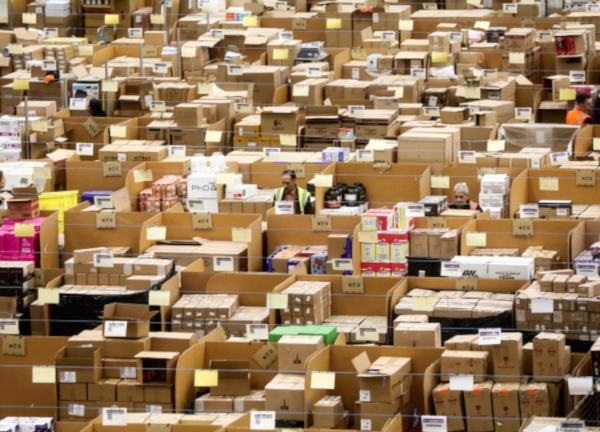Amazon has become the single most-patronized online retailer in the world, and you’d think that quality of products and service would have something to do with that. But, apparently, there’s a growing tide of dissent among buyers who have received substandard food items…
 A typical Amazon fulfillment warehouse. With more than 22 million
A typical Amazon fulfillment warehouse. With more than 22 million
returns and complaints a year to deal with, it’s clear that the
company’s current business model isn’t working.
There’s a major flaw in the Amazon business model – one which puts both buyers and brand owner/manufacturers at risk. It’s one thing to purchase a collectable item or a used book from a third-party vendor whose merchandise is not monitored directly or shipped by Amazon. But it seems that buying cut-price food items from third parties (i.e.- not the original manufacturer) is nothing short of a crap-shoot. Amazon has been struggling – quietly – under a burden of thousands of complaints from buyers who’ve bought consumables on the online retailing system only to receive expired, spoiled, counterfeit or ‘not for resale’ merchandise.
The Amazon sites are studded with listings that bear complaints posted by folks who received substandard products which were shipped by Amazon from its own warehouses. At least, in these cases, Amazon makes good with the buyer on the deal and posts, in response, “This item was fulfilled by Amazon, and we take responsibility for this fulfillment experience.”
But the mega retailer remains proud of its ‘A-to-Z Guarantee’ under which the company insists, in a statement, “…customers are always protected whether they make a purchase from Amazon or a third-party seller.”
However, with more than 22 million returns and complaints to deal with annually, it’s easy to see how the company faces a virtually impossible task staying ahead of the bad apples in its barrel – even using the best new technology it can get its hands on and an army of human monitors to keep track buyer feedback and identify miscreants hiding behind Amazon’s good name – and that of the brand owner whose expired, damaged or adulterated goods are being flogged as legit.
The problem…
One industry observer told CNBC Amazon has espoused a business model for third-party sellers that just doesn’t work when when it comes to food or other consumable products. Duh! The bulk of the bad merchandise never sees the inside of an amazon warehouse, much less receives an inspection. What’s a mega-retailer to do?
The solution is obvious…
C’mon, Amazon! If you can’t keep track of the crappy merchandise third-party sellers are dumping on folks through your system, you can do one simple thing to avoid being caught in the middle: Stop accepting third party listings for foods, dietary supplements and other consumables. There’s nothing buyers can’t order directly from the makers or authorized resellers.
Or are are you, Jeff Bezos and your billionaire cronies, just too greedy to forego the relatively small amount of money you make from third party consumables transactions? I know that sounds harsh, but have you stopped to weigh the cost of dealing with the complaints and returns issues against what you actually make from these goods? Bet you’re actually losing money, on balance.
~ Maggie J.

